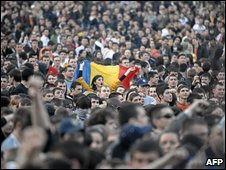Moldova students raid parliament
parliament in protest at the victory of the governing Communist Party
in Sunday’s general election.
Witnesses say crowds
poured into the building through smashed ground-floor windows and
shortly after hurled furniture out and set it alight.
More than 30 people – both protesters and police officers – have been treated for injuries, medical officials said.
President Vladimir Voronin’s office said he would make a statement later.
Tear
gas and jets of water were blasted at protesters by security forces
defending the parliament building. The presidential office was also
attacked.
Representatives of the opposition parties, are
among the thousands of mainly young people protesting in the centre of
the capital, Chisinau.
They believe the election result was fraudulent.
The
mayor of Chisinau, Dorin Chirtoaca, who is deputy head of the
opposition Liberal Party, said the protests were justified “because
people did not vote for the Communists in such large numbers”.

Many Moldovans have taken to the streets against the Communists
|
The Communists won 50% of votes in the election declared “fair” by observers.
They were followed by the centre-right Liberal Party with almost 13% of the votes, and the Liberal Democratic Party with 12%.
Reports from the country say local television stations are off-air and the national radio station is broadcasting folk music.
No reports about the protest have been included in its radio news bulletins.
Presidential successor
President Vladimir Voronin is expected to step down on Tuesday after two terms in office.
He
is barred by the constitution from running for a third term, although
he has indicated he wants to remain involved in affairs of state.
Parliament
will begin the process of electing his successor on Wednesday. The
Communists have the biggest party in the new parliament but not
sufficient votes to select the president alone.
If no president is chosen before 8 June, another parliamentary election must be held.
The
pro-Western centre-right opposition parties have said they will not
join a coalition with the Communists, who favour strong links with both
Russia and the European Union.
Mr Voronin’s successor
will lead the poorest country in Europe, where the average wage is just
under $250 (£168) a month, and will inherit an unresolved conflict over
the breakaway region of Trans-Dniester.
Correspondents
say the dispute is reminiscent of the situation in South Ossetia before
last summer’s war between Georgia and Russia.
The region
has run its own affairs, with Moscow’s support, since the end of
hostilities in a brief war in 1992. Mr Voronin resumed direct talks
with Trans-Dniester last year.








